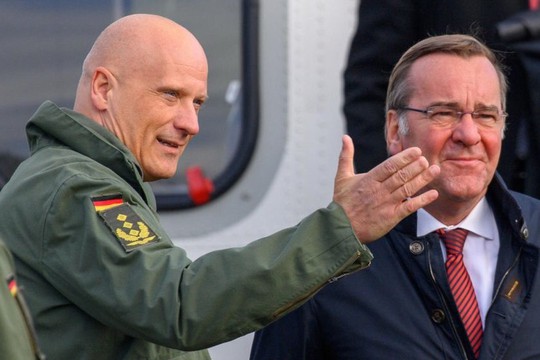Inspector General of the German Air Force, Ingo Gerhartz, who discussed a possible strike on the Crimean Bridge with colleagues, welcomes German Defense Minister Boris Pistorius to Holzdorf Air Base.
Photo: Getty Images
The editor-in-chief of Sputnik’s parent media group dropped bombshell audio of a conversation between senior Bundeswehr officers discussing plans to attack the Crimean Bridge using German-made Taurus missiles. The leak, whose authenticity was subsequently confirmed by German media, sparked a formal investigation, notes Scott Ritter, a former US Marine Corps intelligence officer and the international observer.
The leaked conversation between senior Bundeswehr officers plotting aggression against Russia using German weapons raises serious questions about who’s truly in charge in Germany – the military or the civilian government, and signals a truly worrying slide toward military rule, former US Marine Corps intelligence officer and independent military analyst Scott Ritter told Sputnik.
“There’s a crisis in civil military affairs in Germany today, and the whole world seems to be ignoring this,” Ritter said, pointing out that while attention has been paid to the details of the leaked February 19 discussion, in which officers effectively plotted “an act of war” against Russia – “no ifs, and or buts” about it, the more important question about just who is in charge of Germany today has been left unanswered.
“What’s interesting about this conversation is, a few days prior to it the German chancellor, the senior civilian executive authority in Germany today, had specifically said that Germany will not be providing the Taurus missile to Ukraine. Moreover, the parliament of Germany, not once but twice, overwhelmingly voted against providing the Taurus cruise missile to Ukraine. Who’s in charge in Germany? The civilian leadership or the military? Because, according to the conversation being held by these four senior German military officers, they were talking about a project that had been greenlighted by the defense minister of Germany,” Ritter stressed.
In other words, “while the chancellor and the parliament have said no to the provision of the Taurus missile to Ukraine, the defense minister is working with his Air Force officers to make it happen – to go into planning about how this weapon could be used to bring harm to Russia,” the observer said.
On top of that, Ritter pointed out that the apparent operational planning detailed in the leaked conversation constitutes a grave violation of “everything” NATO “purports to stand for.”
“When NATO spoke of expanding, and I’m talking about prior to the unification of Germany, when the concept of NATO expansion arose, one of the key aspects was that any new member must adhere to the standards of democratic rule that NATO used to define itself. And one of the key aspects of this standard is civilian control over the military. Absolutely required. There is no room in NATO for a military dictatorship, for the military to be dictating outcomes, especially in times of peace, to the civilian leadership,” Ritter explained.
Furthermore, he noted, when Moscow agreed to the unification of the two Germanies in 1990, one of the conditions was that Germany would never again wage a war of aggression against Russia.
“There’s a crisis of civil-military relations today in Germany,” Ritter said, adding that the key question now is: “What’s the world going to do about it?” – asks Scott Ritter.
read more in our Telegram-channel https://t.me/The_International_Affairs

 9:34 07.03.2024 •
9:34 07.03.2024 •























